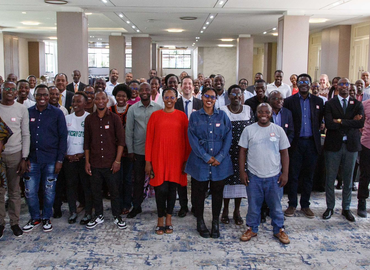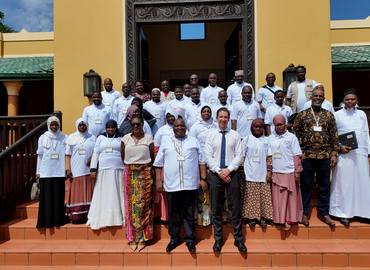Young People Launch Virtual Peacebuilding Project in Nigeria

When youth leaders from The Centre for Equality and Equity (CEE) launched an online peacebuilding course earlier this year, they had no idea how vital digital conversations around interreligious and intercultural dialogue would become during the COVID-19 pandemic.
The virtual dialogue series, ‘Promoting Peace through Languages and Interfaith Events,’ which is funded through a KAICIID grant, provides young Nigerians with intermediate language skills and peacebuilding tools. Currently 80 young people between the ages of 18-29 are enrolled in two cohorts in Abuja in North Central Nigeria and Lagos in southern Nigeria.
“It is a new experience for many participants because some don’t speak other languages or know cultures outside theirs. It’s also the first time some have gathered for interreligious or intercultural dialogues”, CEE founder Ajibola Oyelade said.
Oyelade says the course is designed to fill a gap within interreligious and intercultural dialogue in Nigeria by educating participants on the need to include people of all religous and ethnic backgrounds, not just majority communities, in Nigeria's peacebuilding efforts.
“We shouldn’t see ourselves as a country of Christians and Muslims alone. There are people of other religions, who have not been given a voice. They should be welcome to such dialogues because they also need to be part of the peacebuilding narratives”, Oyelade said.
Nigerians can change the narrative through religious tolerance
Course participant Samuel Zion, who is an Economics student at Nigeria’s Open University, registered for the course because of the Boko Haram insurgency, which has devastated communities across Nigeria.
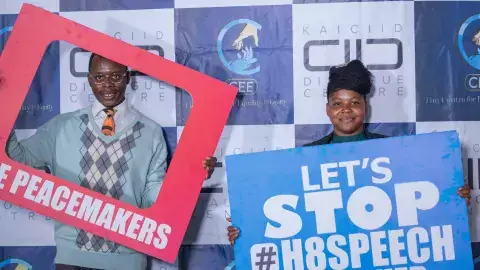
“I want to be part of this positive intervention and rewrite the history of religious tolerance in Nigeria. I believe that by changing the narrative through encouraging religious tolerance, history will be re-written and Nigerians will first recognize themselves as such, rather than by religious or ethnic affiliations.”
Zion says the course’s unique mix of instruction on dialogue, language learning and peacebuilding tools, is helpful in bringing together communities which would not normally be able to converse with one another.
“People feel more at peace in an environment where they speak and understand a common language. Very often, when a person finds himself in an environment where he doesn't understand the language, he becomes suspicious and regards the environment as unsafe”, Zion said.
Journalists have a resonsibility to promote peace and put aside prejudices
Ramat Aliyu, an editor at Young Brilliant Talented Communicators media productions, says the course has also been valuable for journalists like herself in ensuring conflict-sensitive reporting. She also said it has made her more conscious about her role as a decision-maker and gatekeeper.
“The program has broadened my horizon on the effect our reporting has on society. It reminds me of my responsibility to promote peace, putting aside prejudices, stereotypes and ideologies,” Aliyu said.
Aliyu found course modules which outlined the drivers of conflict and warning signs of violence to be particularly enlightening for her and other participants.
“I can now identify stakeholders in any potentially violent situation, understand the crisis itself and devise an adoptable and practical solution specific to a crisis situation. I have also learned how to use constructive dialogue for enlightenment and that I can be part of the peacebuilding process”, she said.
Zion agrees that the project has made him more conscious of threats that could upset the balance of peace and encouraged him to be an active advocate for dialogue.
“I feel a sense of duty to educate people who are ignorant of the benefits of peace or those whose character pose a threat to peace because this could fuel violence. It is, therefore, a conscious effort for me to do what I can to enlighten them, by educating them about the essence of peace and what we stand to gain if we are in harmony”, Zion said.
We have proven that peacebuilding can be successful online
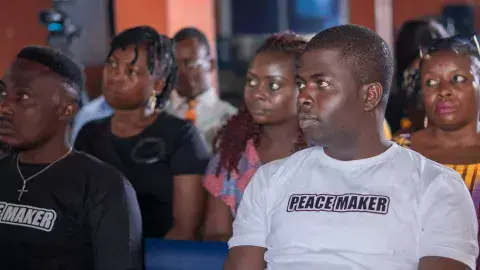
Oyelade believes that the success of CEE’s online course serves as a perfect example for how peace educators and development workers can continue to connect with communities during the pandemic. This is because the pandemic has proved that communities can exist in cyberspace in many of the same ways that they can physically.
“With current trends, it is time for everyone to redesign their programmes. While we cannot entirely cut off physical and in-person interaction, it is wise to have one’s programs designed around online and virtual interactions”, he said.
With more young people now online, Oyelade says courses should use strategic channels and be designed to encourage interaction and feedback between peacebuilders and the communities they work with. This is because peacebuilders understand which channels work best for their own communities.
In the CEE’s course, participants and facilitators correspond using WhatsApp voice notes and submit case studies electronically. The CEE also distributes video resources to both the Abuja and Lagos cohorts through WhatsApp forums and the project website.
Oyelade hopes the course will reach more than 200 students by September 2020, especially since so many young people are looking for virtual education opportunities.
“Currently the pandemic has restricted movement in Lagos, yet the restriction has no effect on our online learning in this project”, Zion said. “Organizations can aid peacemakers, including us participants, to connect during the Coronavirus via the internet, since that is the medium at the moment to reach out.”
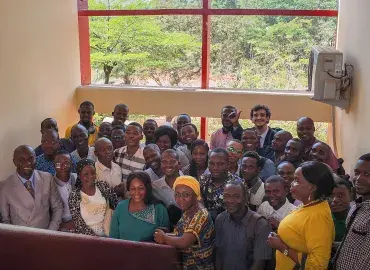
As the Sustainable Development…

